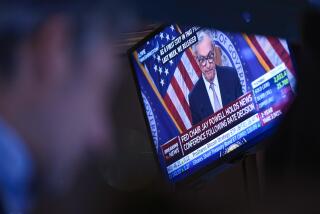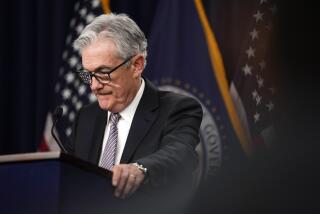China to raise benchmark rates
- Share via
Reporting from Beijing — In a surprise move that many economists were calling for, China’s central bank said Tuesday it would hike its benchmark lending and deposit rates for the first time in three years.
The move is the clearest sign yet that policymakers are concerned about excess liquidity and over-investment in the world’s second-largest economy.
China has been deluged with easy money since the country’s banks issued a record $1.4 trillion last year to combat the effects of the global financial crisis.
The result of that move has been soaring housing prices and the fastest increase in inflation in 22 months.
The People’s Bank of China said on its website Tuesday evening that the one-year deposit rate will increase from 2.25% to 2.5% beginning Wednesday. The lending rate will increase from 5.31% to 5.56%.
“This is a step in the right direction,” said Michael Pettis, a professor at Peking University’s Guanghua School of Management. “In the long term, they should do more. But like the exchange rate, you can’t change it too quickly, or there will be financial distress.”
China is facing greater pressure to rebalance its economy as the global recession continues to rattle trading partners such as the United States and Japan. One of the reasons Washington has been adamant that China raise the value of its currency is so the Asian giant can rely more on domestic consumption rather than dominate the world’s share of exports.
Though the hike is small, the increase in the deposit rate should help Chinese consumers gain bigger returns on their savings. The new benchmark still falls short of China’s inflation rate — or consumer price index — which reached 3.5% in August and is expected to have climbed to about 4% in September.
Low deposit rates were one of reasons Chinese investors shunned savings accounts and poured money into real estate, which provided almost guaranteed profits.
China has introduced a slew of cooling measures, such as higher down payments and restrictions on the purchase of multiple homes, to temper the property market. But housing prices increased month on month in September for the first time since May.
Analysts said the interest-rate hike could succeed where the cooling measures have failed by making mortgages more expensive.
“The property sector has … proven resilient to tightening measures,” Ben Simpfendorfer, chief China economist for the Royal Bank of Scotland, said in a note to clients Tuesday. “Sales bounced back quickly after tightening in January and April, and a third round of tightening in September appears to have had limited effect. While leverage is lower in China relative to the developed economies, higher mortgage rates will still bite.”
Mark Williams, senior China economist for the London-based firm Capital Economics, said Tuesday’s announcement also may be in response to September data that showed banks exceeded lending targets.
“The move will not directly affect the amount banks lend,” Williams wrote in a note Tuesday. “However, the government has given a strong signal that it would like credit growth to slow.”
More to Read
Inside the business of entertainment
The Wide Shot brings you news, analysis and insights on everything from streaming wars to production — and what it all means for the future.
You may occasionally receive promotional content from the Los Angeles Times.











